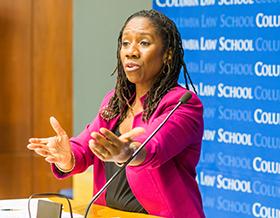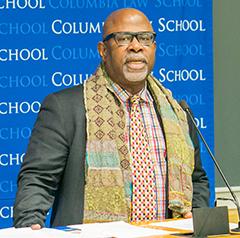Race, Rights, and the Future of Democracy in America
Sherrilyn Ifill, President and Director-Counsel of the NAACP Legal Defense and Educational Fund, Delivers the 2015 Paul Robeson Lecture
New York, March 3, 2015—The infamous police killings of Michael Brown and Eric Garner exemplify a longstanding culture of discrimination and violence against African Americans, said Sherrilyn Ifill, president and director-counsel of the NAACP Legal Defense and Educational Fund (LDF), in a Feb. 12 address at Columbia Law School. Ifill was on campus to deliver the 2015 Paul Robeson Lecture, presented by the Center for the Study of Law and Culture.
| Sherrilyn Ifill, president and director-counsel of the NAACP Legal Defense and Educational Fund (LDF) |
Ifill said the cases that have spurred the “Black Lives Matter” movement are high-profile examples of the endemic social injustice that has fueled LDF’s 75 years of service.
“We must be very clear that this is not a new problem,” she said. “You are now seeing it because we have cell phone video and social media, but it is not new."
Ifill said the “Black Lives Matter” movement organized by diverse coalitions of young people in recent months will help the U.S. reach racial equality but also argued public interest lawyers play a special role in creating change.
“Lawyers litigate the narrative of what justice means, of what equality means,” she said. “The work we do is democracy-maintenance work, not some niche activity that’s just relevant to blacks, gays, women, or Latinos. We check the foundations of this country, looking for cracks and fissures.”
| Professor Kendall Thomas, director of the Center for the Study of Law and Culture |
In introductory remarks, Professor Kendall Thomas, director of the Center for the Study of Law and Culture, linked LDF’s work to the legacy of one of Columbia Law School’s most esteemed alumni, Paul Robeson ’23. Robeson was a renowned actor, singer, and athlete who became an international symbol for his courageous advocacy against segregation and injustice.
“The Paul Robeson Lecture is an opportunity to honor and remember one of our most remarkable graduates,” said Thomas, the Nash Professor of Law. “He is a model to which all of us who believe in freedom should aspire.”
The Robeson Lecture is a highlight of the programming year for the Center for the Study of Law and Culture. Past lecturers have included Angela Y. Davis, Cornel West, K. Anthony Appiah, Penelope Andrews, Albie Sachs and Manning Marable.

